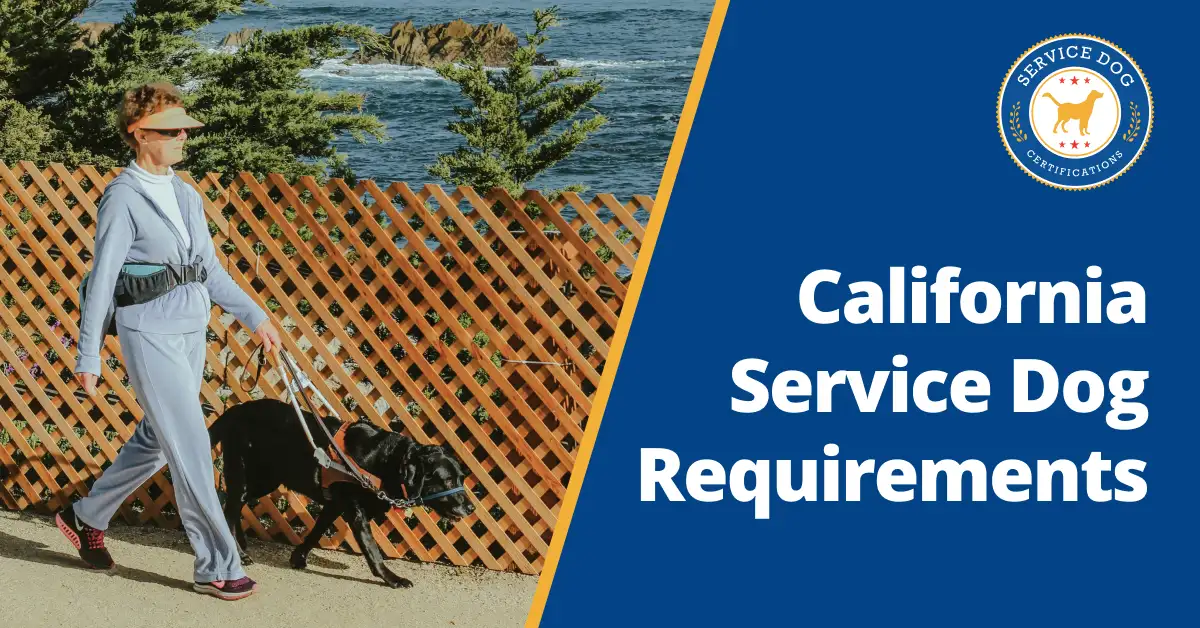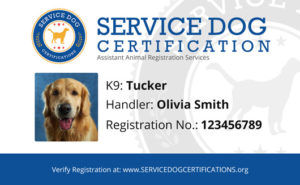Florida Service Dog Requirements

Service dogs in the State of Florida are covered by laws that align with the federal Americans with Disabilities Act (ADA). This means that you have the right to use a service dog in public places and only have to answer specific questions about your dog and disability. These rights can’t be denied, regardless of local jurisdiction laws or private business ownership rules. Anyone who uses a service dog in Florida is protected by these laws unless their service dog misbehaves in ways that threaten the health or safety of the people around them.
In this article:
- What qualifies as a service dog in Florida
- Identification and registration requirements for the State of Florida
- Leash requirements for service dogs
- Service dog behavior requirements
- Misrepresentation of a service dog
- Public accommodation for owners of service animals
- Safety of service animals in Florida
What Qualifies as a Service Dog in Florida
The ADA definition of a service dog is similar to Florida Statute 413.08, which defines a service animal as one that is “trained to do work or perform tasks for an individual with a disability.” These service dog tasks are essential for the quality of life of individuals with disabilities. For instance, a service dog may help retrieve a life-saving medication, guide the visually impaired, or help with mobility issues.
In Florida, service dogs can be trained by either the handler with a qualifying disability or a professional canine trainer. There is no requirement for a service dog to be trained by a professional, and individuals can train their own dogs to meet the specific needs of their disability.
It’s important to note that a service dog and an emotional support animal are not the same thing. Florida law, following federal guidelines, does not grant emotional support animals automatic access to public spaces, like restaurants, stores, or public transportation. Even if you have documentation, you may still be unable to bring your emotional support dog into a shop or restaurant.
Identification and Registration Requirements for the State of Florida
According to Florida Statute 413.08, documentation that a service animal is trained is not required. Although not mandatory, registration can allow for easier access when you have a corresponding ID card available. Accessories like ID cards, vests, and tags help staff members at the places you visit recognize your dog as a service dog, which can curtail intrusive questions before they start.
To protect the service dog owner’s privacy, staff cannot inquire about the nature of the service animal’s owner’s disability. They may only ask two questions:
- Is this a service animal required for a disability?
- What task has the animal been trained to perform?
Neither business nor private entities may ask personal questions such as:
- Asking the owner to have the animals perform their assigned task as a demonstration.
- Asking the service dog owner to declare their specific disability.
- Demanding documentation regarding registration or training.
Leash Requirements for Service Dogs
Florida laws require that a service animal must be under the control of its owner at all times. The service animal must be properly outfitted with supplies such as a leash, harness, or tether. If a leash, harness, or tether interferes with the tasks the dog must perform, then the dog must be under the owner’s control at all times through the owner’s voice or signal commands. Violations can result in fines, with potential penalties ranging from $100 to $500 or more, depending on the specific location and number of offenses.
Service Dog Behavior Requirements
Both ADA and Florida laws are explicit about their expectations for service dog behavior in public places:
- Service dogs can be removed or excluded from an area if the dog is out of control, is not properly housebroken, or poses a safety issue to the public.
- Damage caused by the service animal is the responsibility of the service animal’s owner.
A properly trained service dog should be able to pass a public access test and behave as a model citizen, regardless of the environment in which they’re.

Misrepresentation of a Service Dog
The state of Florida considers the misrepresentation of a service dog a second-degree misdemeanor. If a person knowingly presents themselves, in writing, verbally, or through their actions, as having a service dog and does not qualify as such, they may be subject to prosecution. If found guilty, a person can face potential penalties of up to $500 in fines, up to 60 days in jail, and 30 hours of community service.
Public Accommodation for Owners of Service Animals
“Public accommodation” is a broad term and, in short, means that people with service animals are allowed anywhere the general public is also invited. For instance, hotels, public transportation, and resorts are examples of areas where service animals are allowed. In addition, service dog handlers in Florida have the following rights:
- Fear of animals or allergies is not a justifiable reason for the exclusion of a service animal.
- If a service animal must be removed because it poses a threat, the service dog owner must be given the option of remaining without the service animal.
- A venue can’t charge a fee or deposit in order for a service dog handler to access their establishment.
Any person who interferes with the rights of a service dog handler may be subject to a misdemeanor of the second degree in the state of Florida. Service dogs can also live in no-pet housing free of charge in Florida because of the Fair Housing Act rules.
Many businesses and venues in Florida are known to be very service dog-friendly. For example, at Disney World and Universal Studios in Orlando, service dogs are welcome anywhere they can be accommodated. Special relief locations are available, making it easier to look after your dog while visiting. Some rides, however, are inaccessible for dogs, so it’s best to check their websites ahead of time.
Jacksonville is particularly service dog-friendly, offering a unique Florida Service Dogs program at Bethesda Park in Jacksonville, FL. The program focuses on training and providing service dogs to individuals with disabilities, with a special emphasis on rescue dogs and fostering owner-dog training partnerships. This program, which is part of the Jacksonville.gov initiative, allows clients to train their own dogs or participate in a foster training program, fostering a strong bond between the owner and the service animal.
Safety of Service Animals in Florida
Florida goes the extra mile to protect its service animals, with laws against any interference or injury. These laws prohibit the obstruction, harm, or intimidation of a service animal by another person or an animal owned by that person. These actions are punishable as a misdemeanor in the first degree or a felony of the third degree, depending on the severity of the incident.
About the Author: Lisa Jo Rudy, M.Div. has been writing on developmental disabilities and mental health since the early 2000s, when her son was diagnosed with autism. Lisa lives on Cape Cod, where she is the proud "mom" of two beautiful cats.
Related Articles

California Service Dog Requirements
In California, a service dog needs to be trained to perform at least one service dog task for a qualifying disability. If you meet those requirements, you can take your service dog almost anywhere with you throughout the Golden State. Californians are protected by both federal and state laws, including under the Americans with Disabilities […]

Read More

Texas Service Dog Laws
Individuals with disabilities whether they are physical or mental often feel isolated because it is harder for them to function in public; this is where service dogs come in. Service dogs provide individuals with disabilities the ability to have more freedom and go out in public without having to worry about what to do if […]

Read More

Colorado Service Dog Requirements
If you have a disability, you may qualify for a service dog. Colorado law aligns with federal guidelines. These guidelines allow a person with a disability to reside, travel, and perform their activities of daily living with a service dog. Colorado also takes the extra step to protect service dogs who are still in training […]

Read More


Me and my mom went into mount dora pizza with my mom’s service dog a few months back in 9/20. One of the employees told my mom that after that day she couldn’t bring her service dog back in and even told my mom when she offered to provide her documentation and id that,that didn’t matter she couldn’t bring her service dog back in because of other customers were complaining. My mom’s service dog is for alerting for medical issues to save my mom’s life. I left a post on their Facebook page about the incident and me,my mom,and several friends and family members have tried contacting them to find out what the issue was with no success. I would like for them to put something up stating they don’t allow any animals including service animals in the business or them be informed how the incident violated my mom’s rights. What do I do?
Heather: If the persist in denying you access when you return again, I would suggest seeing a lawyer since they are more than likely in violation of both State and Federal laws. I’m not a lawyer, but I would tell you to go see one.
IMO I would just do what you’re doing by posting the incident all over so people pressure them to do the right thing. If you do keep going there for pizza I would recommend ordering BEFORE you go in as take out so they don’t do something to your food! Then bring in your mom and her dog. By going back though you are supporting their business. Did you tell the girl what the ADA rules are for disabilities? Maybe she didn’t know? I would maybe send them a informative letter letting them know what happened and give the owners a chance to make it right because they may not have told everybody what the rules are. Good Luck
I was supposed to get my service dog from a Paws for Veterans as I have multiple illnesses and have bad balance and vertigo so I fall a lot and have very bad low blood sugar a lot. However, the organization was a scam and since my problems are not Service Connected so I had to pay $4,000 for its training. They are being investigated by the FBI for Fraud against Veterans & Sr. Citizens and animal abuse. I never got my $4,000 back or a service dog. (I only had the money to pay for its training as I had exactly $4,000 left from a settlement for being hit by a car while crossing the street with the walk light. Actually, I have been hit 3 times while crossing a street with the walk light) I am in a manual wheelchair in my apt. or if I go outside I have to use a scooter or Battery operated Chair.
I have been looking for someone to help me with the Obediance Training then the Service Dog Training but have been unable to find anyone in my area. (I live in Merritt Island, Fla) Can you help me as I really need the help of a Service Dog as I live with my son but am alone all day while he works. I can be reached on E-mail at ” or phone # . Any help will be greatly appreciated. (At present I have a 4 month Lab/German Shepherd puppy and really need help with her, but think she will make a good Service Dog for me) Besides the falling and low blood sugar I also have strokes, heart problems, Angina. Arthuritus (sp) and more
you have a great puppy that would make an excellent service dog. I would recommend obediance training first. Pet smart or most pets store offer them. Some even offer emotional animal support training, but be forewarn that emotional support animals do not have the same rights as a service dogs. You may be having issue about the service dog training.. that is where i ran into problems. ” According to Florida Statute 413.08, documentation that a service animal is trained is not required. Although not mandatory, registration is recommended as it allows easier access to all public accommodations. Having identification and registration available, though not necessary, mitigates any unexpected problems or harassment. ” This causes the issue when inquiring about training since there is no official guidelines how can you say yes to that you can train your dog to be a service dog. Start with basic obedience and train your puppy to help you. one command you really won’t need is stay since they are with you at most times.
I started off with a prescription from my doctor for my dog. I have doctor’s orders. Have you checked into the VA for service dog training prog. or selftrain tips? Who’s gonna spend most of their time with them. Who better than you to train anyway. Keep posting! I’m trying to find my way too.
If you fall under The American Disability Act …report this incident the ADA organization.
They will contact the facility and investigate this for you.
If the pizza place is breaking the law they will force all employees to complete a course and possibly fine the business.
She could take them to court for that. Find an interested lawyer
If u don’t have a specific disability can your dog still be trained as a service dog
A service dog must be trained to assist with an eligible disability.
If someone has a service dog but doesn’t have it with them all the time is it still considered a service dog?
Service dog owners are allowed to leave their dogs at home if they won’t be needed or leave them in the care of someone else.
What “Service dog” registration does Fla recognize? Cape coral requires the vet to report vaccinations and ownership. How can a rescue be registered? My last dog was trained for my needs in Georgia and was only denied service in New Orleans. I am a 74 yrs old DAV requiring mobility issues. My new pup is a rescue with no papers. This dog is being trained as a working K9 in the Marines, not to kill we will skip the aggression training, She will be registered in Lee Co Fl with sheriff’s dept , my cost $25.00 what else do I need? Without my dog I go no where and do nothing.
You do not need to register a service dog. Service dog registration is a completely optional step for service dog owners. No one can require you to show registration for a service dog as a condition to access.
Thank you for your service. I’m a Disabled Veteran and suffer from PTSD . With the recent passing of my father I have had very stressful moments that come with no warning. Not sure of what triggers it but since the passing of my dad it has gotten worse. Thank you for providing this information for my new family addition. Where to find a trainer I would have wanted to know.
Unfortunately we do not provide referrals for trainers, our services are only for already qualified service dog owners. We wish you the best of luck however.
If I have an short term rental property in Florida can I ask the renter to show their certification for their service dog?
The proper way to validate a service dog if you’re a landlord is by asking two questions (and only if the need for the service dog is not obvious): 1. Is the service dog required for a disability? and 2. What work or task has the job been trained to perform?
Can my condo association that does not allow pets deny my request to have my emotional support dog in my unit?
If you have provide a legitimate ESA letter to your condo association, they can only deny your ESA if they have a valid exemption. For example, if they have evidence your ESA is a health or safety threat to others. You may find this post helpful: https://www.servicedogcertifications.org/how-to-get-an-emotional-support-dog-letter/
We were not allowed on the Allegiant airplane because we didn’t have the correct certification. Would this qualify us to travel?
You do not need a “certification” to board flights with service dogs. U.S. airlines will require you to submit the DOT’s Service Animal Air Transportation Form. Please see this guide for more details: https://www.servicedogcertifications.org/flying-with-a-service-dog-guide/
I was told by a vet that my American Staffordshire Terrier can not be a Service Animal, my “pitbull” was not allowed to be one because of her breed. Mind you my Service Animal has been registered for 10 yrs now and has had no issues. Is there a law saying my SA because of her breed is not allowed to be one?
Service dogs can be any breed. ADA and HUD rules actually prohibit third parties from discriminating against a service dog solely because it is a certain breed. You may find this article helpful: https://www.servicedogcertifications.org/landlord-service-dog-esa-breed/
What qualifies the dog as a service dog?
We think you will find this article helpful: https://www.servicedogcertifications.org/service-dog-requirements/
A service animal is by definition of the American Disability Act is an animal which helps a person overcome their disability. The disabilities are blindness, the guide dogs, deafness , animals trained to respond to phone doorbell or someone calling the persons name, seizures, animals trained to prevent someone from harming a person during a seizure, or mobility animals that pull a cart to move a disabled person around. A emotional support animal is not classified as a service animal. There are drugs and treatment for goose who suffer from PTSD and those animals are not covered by the ADA.
That is correct regarding ESAs – they are not in the same category legally as service dogs. However, the number of disabilities that qualify for service dogs is much greater than the ones you listed! Psychiatric service dogs for example help people with mental health issues: https://www.servicedogcertifications.org/psychiatric-service-dog/
Can a guinea pig be a service /emotional support animal and be allowed on flights?
A guinea pig can be an emotional support animal, but not a service animal. And ESAs are unfortunately not allowed on planes any longer.
Does ADA provide or allow a family with more than one dog to register both or all dogs (regardless of size) a service dog patch?
If someone has 2 small dogs that they push around ( not walking or carrying ) in a double dog carrier while on a cruise and each dog has a service vest yet both dogs bark aggressively towards humans on the ship. Does ADA provide both dogs in same family service patches?
How to identify if someone if falsified their animals just do they can bring them on ship or whatever when ADA doesn’t allow anyone to second question them.
Many people need service animals for various reasons but aren’t “real” service animals trained not to be aggressive or attack other humans ( unless their owners life is in jeopardy )?
Thank you
You don’t need a registration or a patch for a service dog under the ADA. You just need to have an eligible disability and a dog that has been trained to perform a task relating to that disability. Even if your dog is a service dog, you may be asked to leave a public establishment if your dog is out of control (i.e., barking aggressively at other people). Please see our guide on service dog requirements for more detail.